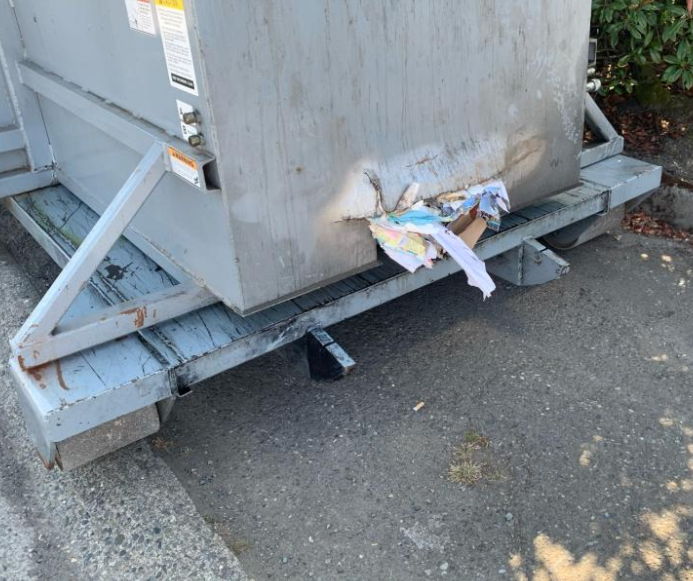What was the world like when your business’s trash compactor was installed? If you are like many of our clients, your current trash compactor went into service when NSYNC was still touring, JNCO jeans were en vogue, and “Tik Tok” was just the sound a clock made. Your waste compactor has seen a lot of action over the years. Through sleet, rain, snow, and heat, you’ve continued to dump your trash into the big steel machine. Now your trash compactor is starting to make you feel like you need a tetanus shot when you look at it. So, how long do commercial trash compactors last? In most cases, it’s 10-20 years, but this is highly variable. There are several important factors that play a role in the lifespan of your trash compactor including usage volume, maintenance record, waste type, weather, and manufacturer quality.
How Does Usage Volume Impact a Compactor’s Lifespan?
In the facilities services space, usage volume varies greatly. We’ve seen Self-Contained Compactors at casinos that get dumped three times a day. We’ve also seen small rural distribution facilities with Stationary Compactors for cardboard that get dumped once a month. Usage varies greatly but has a substantial effect on the lifespan of your compactor. In general, the more often your compactor needs to be dumped the shorter its lifespan is.
How Does Maintenance Record Impact a Compactor’s Lifespan?
Just like any piece of industrial equipment, how well you maintain your trash compactor plays a big role in its lifespan. Most businesses wait for problems to occur before addressing them. This is the wrong approach to have if you want your compactor to last. Preventative maintenance will extend the life of your machine. While you don’t control most of the factors that impact your equipment’s lifespan, you do control this one. Setting up a preventative maintenance schedule for your compactor is the single most impactful step you can take to increase its lifespan.
Want to extend the lifespan of your compactor? Set up a Preventative Maintenance schedule today!

How Does the Type of Waste Impact a Compactor’s Lifespan?
Waste material in a trash compactor varies greatly by application. There is no standard for how waste material will affect the lifespan of your compactor, but here are some factors to consider. The most corrosive force found in nature is water. It gives us incredible natural wonders like the Grand Canyon. In commercial trash compactors, water and liquid waste are factors that cause corrosion and rust on the moving parts. Even Self-Contained Compactors and Vertical Compactors that dispose of wet waste, get liquid damage over time. Sugar or acids added to the liquid waste will also speed up the decline of the machine. If you are running a movie theater or a restaurant buffet that disposes of high volumes of sugary & acidic wet waste then you will need to factor that into your replacement schedule.
How Does Weather Impact a Compactor’s Lifespan?
As we’ve established, water causes corrosion and rust, so if you operate in a region with high precipitation then you may want to consider an enclosure to protect your compactor from the rain or snow. Extreme temperatures, both hot and cold, can also impact your compactor by affecting the viscosity of the fluids in its hydraulic system. Freezing cold temps make the fluids thicker, preventing them from flowing and dispersing evenly. Scorching hot temps make fluids thinner, leading to oxidation and potentially even a vapor state. In either case, this creates a lack of lubrication which may cause damage to critical components of the machine like pumps, cylinders, and valves. In addition to the hydraulic system, extreme temperatures can also be harmful to the electrical components of the machine. Overall, the more your unit is exposed to extreme elements of weather, the shorter its lifespan is expected to be.
How Does Manufacturer Quality Impact a Trash Compactor’s Lifespan?
As with any product, some brands are better than others. Compactors are no different. Picking a quality manufacturer is key to the lifespan of your unit. When it comes to trash compactors, there’s no more brand you can trust more than than FleetGenius Compactors. Our compactors come with exceptional structural integrity and high-quality component. We build them to last.
Overall your trash compactor’s lifespan depends on several factors including usage volume, maintenance record, waste material, weather, and brand. While you have little to no control over most of these factors, you can extend your equipment’s life by setting up a regular preventative maintenance schedule. In addition to extending your compactor’s life, the reports generated from regular maintenance checks will also prevent downtime by keeping you from getting caught off guard when your trash compactor is nearing the end of its life. When it is determined that your compactor is nearing the end, you need to plan for a replacement. FleetGenius is here to help you with this process. If it’s time for a new compactor don’t just upgrade without getting anything in return. Take advantage of our CoreX® Program and get credit for your old compactor towards a new one.
